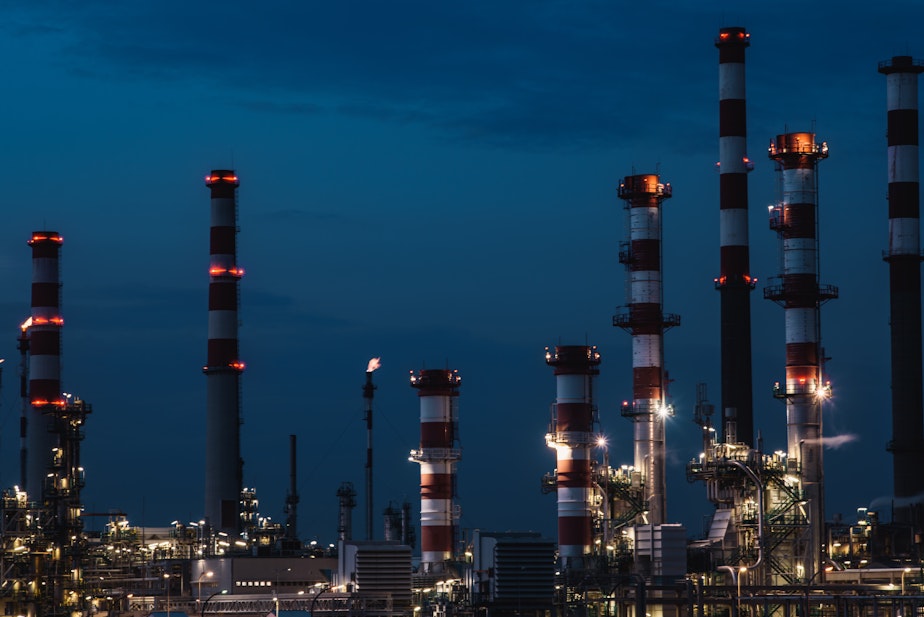How Inslee’s climate agenda just got a boost

Ever since Jay Inslee became governor of Washington, he has focused on fighting climate change. But the state's carbon dioxide emissions have kept growing in spite of Inslee’s reputation as a climate hawk.
Now, the state Legislature has given Inslee’s climate push a big boost. Laws they just passed are expected to reduce the state's collective toll on the climate, and could even change the kind of car you drive, or bus you take.
KUOW environment reporter John Ryan briefed Kim Malcolm on what to expect.
This interview has been edited for clarity.
Kim Malcolm: Democratic lawmakers are touting new laws which, they say, will have big benefits for the climate.
John Ryan: One of the two new laws goes after the biggest polluters. The other goes after small polluters who are ubiquitous, people who drive cars and trucks. The two laws together are kind of the big missing link of Inslee’s long-held, long-pursued climate agenda.
Inslee is referring to what's known as a cap and trade law. It would go after the biggest polluters, like oil refineries, pulp mills, and cement plants. Over time, it would force them to clean up their acts, climate pollution-wise. If they do need to keep polluting, they have to pay more to do so.
Sponsored
The other law goes after smaller polluters, like me driving my car.
Yes. They call it a low carbon fuel standard. Basically, it would over time transition the "juice" that cars run on to something less harmful to the climate, whether it's replacing gasoline with a mix that might have more biofuels in it that pollute less, we're switching cars over to electric motors altogether.
Inslee has previously tried to get similar measures through the Legislature, but he's failed. What was different this year?
Besides the pandemic, a big difference was that the Democrats had a bigger majority this year. They were able to accomplish things they weren't in past years. It was interesting to watch. The cap and trade bill really shattered the usual alliances that we see in Olympia. We saw the state's biggest oil refiner, that's BP, switch sides and support this climate measure. We saw environmental advocates split over the bill, and we saw racial justice advocates weigh in on both sides.
Some said it would hurt the most polluted communities that tend to be communities of color. Other advocates like Fawn Sharp, the head of the Quinault Indian Nation, and also the head of the National Congress of American Indians, said this cap and trade bill was needed to help communities like hers endure.
How much good will this do overall for the climate?
It depends, in part, on how things are pursued. For example, the cap and trade is called a market-based mechanism. It's kind of left up to businesses to decide how they go about reducing their emissions. If we see a switch from diesel trucks to biodiesel trucks that might not do as much for the climate as if it was a switch altogether to electric trucks.
Of course, Washington state is just a drop in the ocean when you're looking at global climate issues, but these days the whole world has to pull its weight if we're going to achieve the dramatic and really rapid transition away from fossil fuels that the world's climate scientists keep telling us is urgently needed.
Climate advocates are claiming this legislative movement as a victory this year. How big victory is it in the larger picture?
I would call it a victory for climate advocates, with a big asterisk on it. That asterisk is highway spending. The passage of these bills is dependent on whether the Legislature can pass a big highway transportation budget in the next couple of years. Of course, highways are the biggest source of our pollution from all the fossil fuel vehicles running on them.
The House just passed a $12 billion budget for spending on transportation. Most of its going to maintain and expand highways, and less than half of 1% of it to climate-friendly transportation. Former Seattle Mayor Mike McGinn called it "climate arson." So, there are things going in both directions out of the Legislature this year.
Listen to the interview by clicking the play button above.





